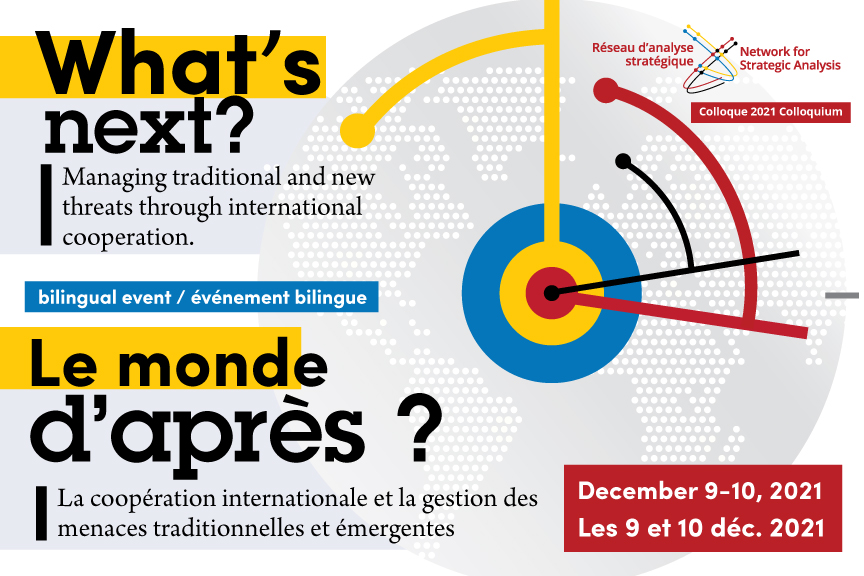What’s Next?
Managing Traditional and New Threats through International Cooperation.
December 9-10, 2021, livestreamed from Ottawa
2021 was a year of transition: some countries entertained the idea of a post-pandemic turn, while others have not. Throughout the pandemic crisis, however, traditional security challenges have persisted, albeit in unique ways. This colloquium will grapple with this challenging transition: on the one hand, through the uneven impact of the pandemic and vaccine diplomacy, and on the other hand, with an international diplomacy that must deal with an increasingly complex security environment and tenser relations among the great powers. It will address these topics through two public roundtables and a public keynote lecture on Day 1 and a closed-door roundtable on Day 2.
Hourly Schedule
Day 1 – From 9am to 5pm
- 9:00 am – 9:15 am
- Welcoming remarks
- 9:15 am – 9:20 am
- Launch Rubicon Platform
- “a unique platform in the francophone research world”, Jean-Baptise Jeangène Vilmer (Institute for Strategic Research, IRSEM), Ryan Evans (War on the Rocks), and Justin Massie (Université du Québec à Montréal)
- 9:20 am – 11:15 am
- Roundtable 1 – The Clash of Regional and International Organizations
- This panel explores the impact of COVID-19 on regional and international organizations. While the logical response to a global issue such as COVID-19 would be to rely on multilateral efforts, the pandemic has crowded out multilateral and even regional initiatives in favour of nationalistic sentiments and self-interested responses by many states. In the post-pandemic period, states may thus invest more in self-sufficiency and in redefining their strategic priorities, including health security. The growing gap between national, regional, and multilateral responses to COVID-19 calls into question the development of global governance and regional integration, as well as the future of international organizations and their capacity for economic and political cooperation.
- 11:15 am – 11:30 am
- Coffee Break
- 11:30 am – 12:30 pm
- Keynote Speech: Kerry Buck (Former Ambassador and Permanent Representative to the North Atlantic Council (NATO))
- moderated by: Charlotte Duval-Lantoine (Ottawa Operations Manager and Fellow, CGAI)
- 12:30 pm – 1:00 pm
- Student Panel
- Best Paper Competition, moderated by Renée Filliatrault) (Advisory Board, Network for Strategic Analysis)
- 1:00 pm – 2:00 pm
- Lunch
- 2:00 pm – 4:00 pm
- Roundtable 2 – Cooperating with Rivals in a Post-Pandemic World The decline of American leadership is said to be directly responsible for
- The decline of American leadership is said to be directly responsible for national governments’ efforts to go it alone in the face of the COVID-19 pandemic. While this trend was especially salient under the Trump administration, it has not entirely disappeared with the arrival of President Joe Biden. According to Robert Kaplan, China and Russia have redefined great power competition and the classical/Western meaning of war, making the response of the West, i.e., the United States, all the more important. Arguing that the pandemic has created a global consciousness, Kaplan recommends that the West respond by strengthening its alliances. With this in mind, the second panel zeroes in on the following question: how do we cooperate with our rivals in a post-pandemic context? While the pandemic has intensified many rivalries, the fact remains that cooperation, even with rivals, is necessary to address the challenges and threats posed by the return of great power competition and the threat posed by revisionist states such as Iran.
- 4:00 pm – 5:30 pm
- Networking Activity
- by invitation
DAY 2 : Private workshop invitation only
- 9:00 am – 9:15 am
- Opening remarks
- 9:15 am – 12:30 pm
- Private round table – Chatham house rules (coffee break 10:30-10:45)
- Inspired by the points raised during the first day’s workshops, the second day of the symposium aims to create a space for discussion between practitioners, researchers, and other security experts. It is also an opportunity to outline recommendations to the Department of National Defence. Designed as a closed-door discussion, the workshop will provide an opportunity to assess the prospects of multilateral cooperation in a (post)-pandemic context, as well as the challenges and opportunities that underlie it. In a changing international political landscape, it will address how Canada, through its foreign and defence policy, could adapt to new global realities. Questions related to several pertinent issue areas deserve extensive reflection: those related to cooperation in (post)-pandemic situations, those addressing the evolution of capacity building and its adaptability to a changing security context, and those related to the balance between great powers in a context of retreating American interventionism and a more offensive Chinese foreign policy. The results of the discussions will form the basis for the Network’s recommendations to the Department of National Defence and will be compiled in a reference document.
- 12:30 pm – 2:30 pm
- Lunch-Networking activity




Comments are closed.